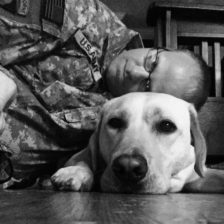TBI (Traumatic Brain Injury) is a violent blow or jolt to the head or body. Some TBI can be mild or severe. March is Brain Injury Awareness Month…and I think we need to be aware of these injuries, while we may not see or notice them, some of our service members have them and they are very real.
According to the DAV (Disabled American Veterans), TBI has been diagnosed in 375,000 service members since 2000.
My husband has TBI.
I’ve read that TBI injuries are different for each individual. One moment the person may be fine and the next life has abruptly changed.
Brain injuries do not heal like other injuries. No two brain injuries are alike and the consequences may be very different.
Symptoms may appear right away or days or weeks after the injury. I’m not exactly sure when Sam noticed that something was off or didn’t feel right with his first TBI, but he’s mentioned that he’s had his “bell rung” a few times.
After multiple injuries (some of those being TBI), Sam went through a lot of therapy–speech therapy for one, to work on some issues. In some cases occupational therapy may be needed in additon to physical therapy, recreational therapy, and vision therapy. Severe headaches (as bad as migraines) can occur, some behavior and mood changes as well as confusion.
This is common in our house. Confusion, trouble concentrating, thinking, remembering. It happens with trash, forgetting to take it out, remembering the names of certain things, having trouble remembering what he read for school (and then having to write a paper about it).
Memory loss is the big one.
I admire Sam for his willingness to work through the TBI. He has apps that help him on his phone, he plays games to work on memory, he writes things down, sets reminders in his calendar, and relies on me to help with dates, birthdays, anniversaries, and appointments.
We rely on each other, and sometimes Sam needs my help a little more because of his memory. Being aware of invisible injuries (not just in certain months) but all the time can be so helpful. Understanding, reading, and educating yourself on these injuries can really help.
While TBI might be frustrating for Sam, he works well to manage and cope with the fact that he feels like he has no memory at all. Understanding why that is, how it happens, and what you can do is key.

